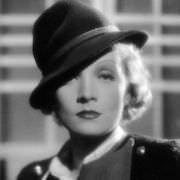Marie Magdalene "Marlene" Dietrich (/mɑːrˈleɪnə ˈdiːtrɪk/, German: [maʁˈleːnə ˈdiːtʁɪç] (listen); 27 December 1901 – 6 May 1992) was a German-born American actress and singer. Her career spanned from the 1910s to the 1980s.
In 1920s Berlin, Dietrich performed on the stage and in silent films. Her performance as Lola-Lola in Josef von Sternberg's The Blue Angel (1930) brought her international acclaim and a contract with Paramount Pictures. Dietrich starred in many Hollywood films including, most iconically, the six vehicles directed by Sternberg —Morocco (1930) (her only Academy Award nomination), Dishonored (1931), Shanghai Express and Blonde Venus (both 1932), The Scarlet Empress (1934) and The Devil Is a Woman (1935)— plus Desire (1936) and Destry Rides Again (1939). She successfully traded on her glamorous persona and "exotic" looks, and became one of the highest-paid actresses of the era. Throughout World War II she was a high-profile entertainer in the United States. Although she delivered notable performances in several post-war films including Alfred Hitchcock's Stage Fright (1950), Billy Wilder's Witness for the Prosecution (1957), Orson Welles's Touch of Evil (1958) and Stanley Kramer's Judgment at Nuremberg (1961), Dietrich spent most of the 1950s to the 1970s touring the world as a marquee live-show performer.
Dietrich was known for her humanitarian efforts during the war, housing German and French exiles, providing financial support and even advocating their American citizenship. For her work on improving morale on the front lines during the war, she received several honors from the United States, France, Belgium and Israel. In 1999 the American Film Institute named Dietrich the ninth greatest female screen legend of classic Hollywood cinema.


















